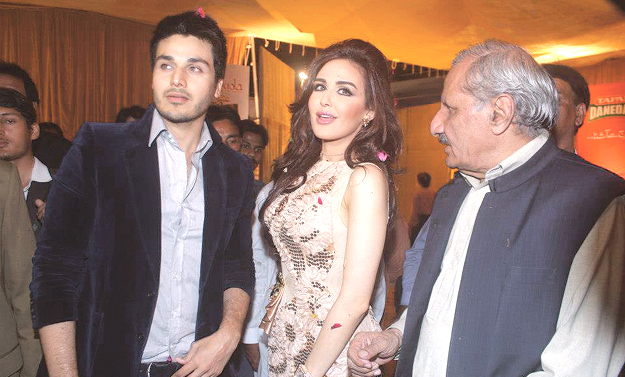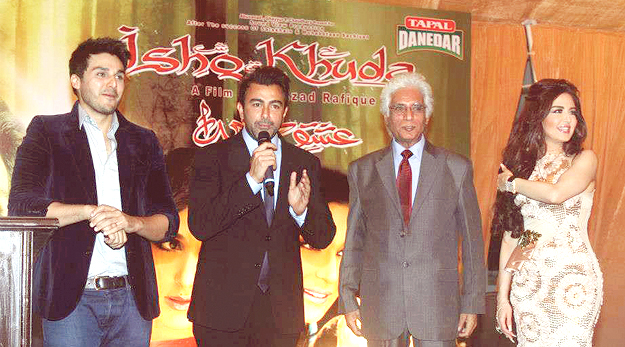![]()
LAHORE:
Lyricist Riazur Rehman Saghar was a prodigy. He may have lost his life to cancer at the age of 72 on Sunday, but he left behind an archive full of unforgettable masterpieces. From Kabhi Toh Nazar Milao, which featured the vocals of Adnan Sami Khan and Asha Bhosle, to Main Tenu Samjhawan Ki sung by Rahat Fateh Ali Khan, this songwriter knew what struck the chord with the audience. The musical maestro’s contributions have not only driven the music industry but have also been the backbone of Lollywood. His work will be treasured for years to come.
“Mark my words, this is the last songwriter who was able to connect poetry and film,” says film writer Pervaiz Kaleem, about one of the most influential Urdu songwriters in Pakistan. Kaleem sheds some light on how this personality came into existence. “Saghar was a self-made man who lost his father during the India-Pakistan partition [while migrating],” he reveals. Living at an air force camp in his early years, Saghar was forced to make a living “doing ordinary labour work in Multan” to support his mother.
He then moved to Lahore after his schooling, and embarked on a journey as a journalist in the ‘60s. But his passion for poetry and film ultimately steered the wheel in another direction. He quit journalism and got on board with the famed Shabab Studios. He started his career off as a mere assistant and little did anyone know he would go on to become one of the most prominent songwriters in the country.
Saghar’s magic on paper — penning down the lyrics of innumerable songs — defined Urdu films in the late ’70s. He also went on to play an important role in the fame of veteran actors Nadeem and Shabnam trilogies but, in the ‘80s, things changed. Punjabi films came in the forefront and Urdu films took a backseat. As we know it, in 1988, Shahbab Studios was shut down and Saghar returned to journalism.
![]()
PHOTOS: FACEBOOK PROFILE
“He wrote a few songs in Punjabi, too. He trained to become a songwriter for films so I think he had that understanding of how to adapt to [changing] circumstances,” adds Kaleem. But with the changing state of affairs in Lollywood, Saghar quietly led resurgence through pop music.
Admirers
Journalist Sajid Yazdani, who shadowed Saghar for nearly 10 years, speaks very highly of the humble man. “He had a great sense [of dedication] when it came to writing. He could write a poem in 10 to 15 minutes no matter how noisy it was,” says Yazdani, admitting that Saghar was deeply engrossed in his work. He gradually made his comeback in Lollywood through a series of Urdu films that were made in the ’90s; he penned down the lyrics for Javed Sheikh, Syed Noor and Shehzad Rafique’s projects.
Saghar then went on to introduce several singers to the world including Shiraz Uppal, who was also a music director. “There’s always been a tendency for most people who were part of the ’60s to remain in the ’60s [forever]. But he [Saghar] was one of the best [writers] of all time; he would adapt to changing times,” says Uppal. “You would never feel an age difference while working with him.” He admits that the maestro had written most of his hit numbers.
![]()
The late songwriter’s final projects are Ishq Khuda and Tamanna. Shehzad Rafique admits that he has worked with Saghar for all of his films, and feels that the music he provided has played a significant role. “He has written poetry which is timeless and I think that it was the emotion present in his songs which made him so popular,” he says, adding that the soundtrack of Ishq Khuda has been written by Saghar. “I think the biggest thing is that he was able to have an impact on the younger generation as well.”
Saghar has left behind a wife and a daughter.
Veteran musician/actor Arshad Mehmood:
My association with him [Saghar] goes back to the old days of EMI Pakistan because we, as a [record] company, had to make contracts with lyricists and composers, separately. I would meet him very often in the studios and all I remember of our interactions is that he was a very fine gentleman and a kind soul. Professionally, he has offered tremendous contributions to Pakistani music at large, specifically film music and we owe him a lot for that. He was a poet who understood music as much as he understood poetry and that was his strength.
Nigar magazine editor Ilyas Rashidi:
He was a kind man. He worked tirelessly for the industry and as a poet, film-maker, writer and director, he received many Nigar awards. However, he was known for his films and lyrics [primarily]. Despite coming from a good lineage, when his health deteriorated, the Punjab government never paid heed to his financial needs; his poor health evaluation indicated that he needed the help. Our poets require more appreciation in their old age and that is one thing they all deserve. Sadly, he received none.
Actor Zeba Bakhtiar:
For me, he was more than a writer; he was a part of my family and would call me his daughter. The film industry is functional again, but we don’t have many people of his calibre and the [kind of] command [he had] on the craft of film-making and music. It’s a huge loss as he was immensely talented.
The lucky ones
Riazur Rehman Saghar was known for his intense lyrics and beautiful poetry. The following singers received great fame through Riaz’s lyrics:
Mehdi Hassan
Nahid Akhtar
Noor Jehan
Ustad Nusrat Fateh Ali Khan
Rahat Ali Khan
Adnan Sami Khan
Waris Baig
Shiraz Uppal
Fariha Pervez
Hadiqa Kiyani
Humaira Channa
Ghulam Ali
Riazur Rehman Saghar was a poet, journalist, columnist, film writer and songwriter. While the late lyricist contributed to more than 2,000 songs for film, radio and TV, this timeline shows some of the most popular songs he is known for.
December 1, 1941 — Born in Bathinda, India.
1957 — 1966 Worked as a journalist.
1959 — 1961 Worked as a sub-editor at Daily Kohistan Rawalpindi.
1973 — Wrote lyrics for the songs Dholak Baja Kay, Sahelian Bula Kay from the film Mr Budhu.
1978 — Wrote lyrics for the song Ankhen Ghazal Hayn Aapki Aur Hont Hayn Gulab from Pakistani film Saheli.
1986 — 1996 Worked as a cultural editor for Daily Nawa-i-Waqt Lahore & editor film and culture for Family Magazine.
Early ‘90s — Was the instrumental force behind children’s musical show Aangan Aangan Tarey.
1995 — Wrote all songs for the Pakistani film Sargam starring Zeba Bakhtiar and Adnan Sami Khan.
1996 — Wrote lyrics for the popular song Dekha Jo Chehra Tera from the Pakistani film Ghungat.
1997 — Started poetry column “Arz Kia Hai” for Nawa-i-Waqt which ran daily.
1997 — Wrote lyrics for Adnan Sami’s entire album Badaltay Mausam.
1998 — Gave lyrics for the superhit song Ho Sakay to Mera Aik Kaam Karo from the film Dupatta Jal Raha Hai.
2000 — Wrote two songs for Adnan Sami’s album Always Yours (Lift Karadey and Bheegi Bheegi Raaton Mein).
2000 — Gave lyrics for the hit song Kal Shab Dekha Chaand Main Nay Jhrokay Main from film Mujhe Chand Chahiye.
2001 — Wrote all songs for Fariha Pervez’s album O Vela Yaad Kar.
2002 — Wrote lyrics for Dupatta and Yaad Sajan Di for Hadiqa Kiyani’s album titled Rung.
2003 — Provided Shiraz Uppal with lyrics for all his songs in his popular album Tera Te Mera.
2007 — Wrote lyrics for hit song Me Jeena Tere Naal from Pakistani Punjabi film Mohabbataan Sachiyaan.
2009 — Gave lyrics for Hadiqa Kiyani’s songs Tuk Tuk from album Aasman.
2010 — Provided lyrics for Main Tenu Samjhawan Ki from Virsa, India and Pakistan’s joint venture.
2012 — Wrote lyrics for the Pakistani film Ishq Khuda.
Published in The Express Tribune, June 4th, 2013.
Like Life & Style on Facebook, follow @ETLifeandStyle on Twitter for the latest in fashion, gossip and entertainment.






























